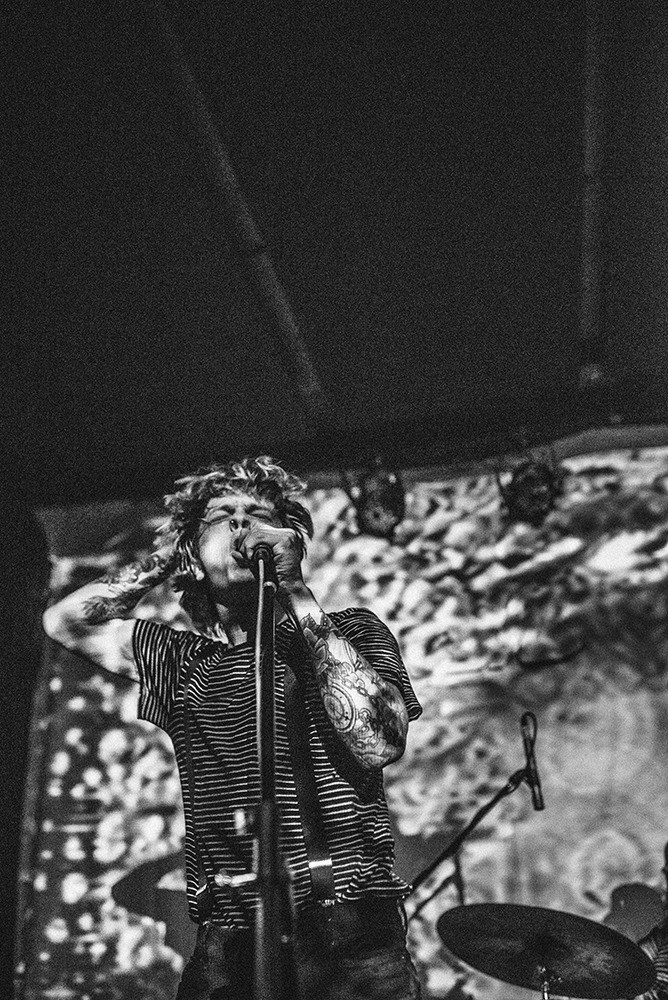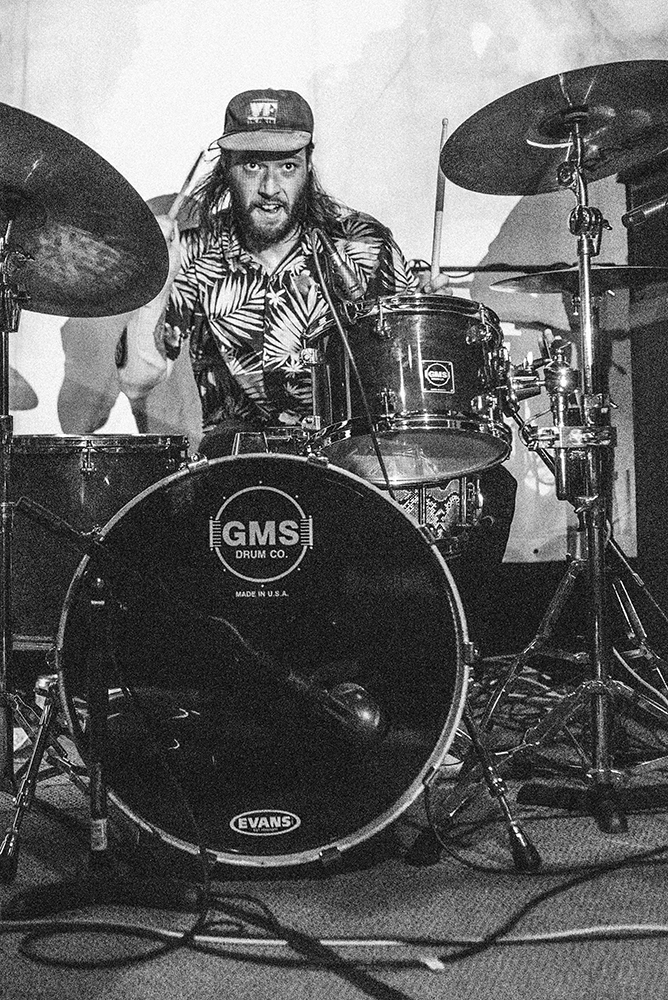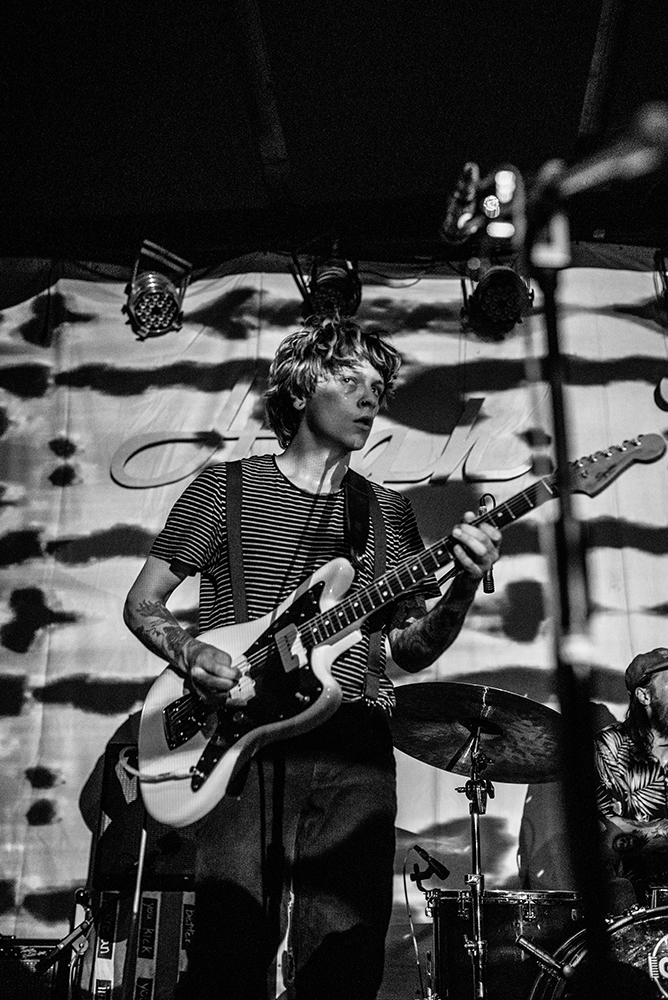Photos and feature by Lauren Khalfayan, find more of her work here.
On stage they’re a mass of shaking heads and flailing limbs, but at the entrance to their rehearsal space, Substation, punk rockers MONSTERWATCH are far more subdued. The thrashing and yelling have been replaced with downcast glances and the silent lighting of cigarettes. Their unassuming nature and no ego, no bullshit attitude are likely contributors to what has solidified MONSTERWATCH as a permanent fixture in the Seattle music scene, along with a solid stream of releases and their reputation for riotous shows. Their gigs might be a glorious mess of guitar smashing, crowd surfing, and the most respectful moshing you ever did see, but all that show is not without substance. Everything from their lyrics to their ethos comes from the desire to provide an escape, or to in fact escape themselves.
Their latest EP, Z O T, furthers their success in this mission. It’s an almost Alice in Wonderland trip down the rabbit hole and into the void. I got together with the band before their gig at High Dive to discuss the EP and how they found their sliver of permanence in a constant state of impermanence.
I’ve really been enjoying Z O T. It seems like there’s this overwhelming theme throughout of wanting to either get away or get people away — of entering this void. What do you feel like that feeling is rooted in?
John Spinney: I mean you described it perfectly. That’s kind of the whole theme of the album. “Zot” is another word for nothing so it’s just kind of being isolated and by yourself, but also wanting to do that. It’s weird. I’m really introverted, so I can’t really handle people too much, but that’s kind of what the whole album is about. Just dealing with anxieties and stuff like that.
Do you think that feeling of wanting to separate or separate yourself, is that something you think is a result of the environment and the time we’re in right now or is it something that’s just innately human and in all of us?
John: Yeah, I mean me and Jack Cornwell live in our vans cause it’s just too expensive to live here and we’re at Substation all the time—we don’t really get out too much so I feel like, the way the songs sound is definitely a result of our surroundings.
Jack Cornwell: And past experiences.
With relating to these past experiences, are these songs inspired by real people, real events in your life or is it like cherry picking elements of that and filtering it into a song?
John: It’s definitely cherry picking and filtering it in cause a lot of the songs, except lost my car, is about multiple instances of struggling and stuff like that.
So there’s not one person out there that you really want to just fuck off?
John: We have a couple new songs about that— we have one song directly about Amazon
Jack C: Fuck ’em. Our new material is different [laughs]
John: It’s like The Cure if they were a punk band.
Jack C: Branching out, you know.
John: I feel like having a variety of song styles in one band is really cool.
In terms of the reality of being a musician in Seattle is there enough reason for you guys to stay here or is it just too logistically a nightmare to go anywhere else?
John: I mean I don’t know if I’d move right now because we got a lot of friends in the neighborhood and it’s going good for us so we’re kind of just sucking it up right now and living in the vans. It’s kind of nice cause it’s cheap.
Jack C: It’s kind of a blessing in disguise. It prepares you cause if you really want to pursue touring that’s what you’ll be doing.
Back to the EP, “Lost My Car” sounds very different: even though thematically it fits very well into the EP, stylistically it’s very different from the other songs and your past stuff. Were you intentionally trying to branch out or was that more of just an organic development?
John: I wanted to put that on there specifically because it didn’t feel out of place, but it would catch people off guard, especially after “I Don’t Get It” which is a really heavy song. I really like that song specifically, that style of music I guess is something I’m really into and I just wanted to express that and write more songs like that as we move forward.
How is it playing that in gigs cause you have all these super high energy heavy songs and them you have —
John: People love it. We were playing a show last month and we finished out set and people were like, “Play ‘Lost My Car’!” It’s cool, it’s just one of those like “Sweet Caroline,” but yeah it’s fun. People respond to it pretty well.
You did the editing for —
John: “Lost My Car,” yeah
Do you like to be really hands on with everything?
John: I mean the band wouldn’t be the same without these two dudes, but as far as visual and aesthetic-wise, I feel like I have a very specific vision, so I’m very nitpicky about it. I like to collaborate with people, so our friend filmed it and he helped me edit it a little bit, but stuff like that I’m really into just doing it on my own. That way you don’t have to go back and forth with people and be like “No, change this, change that.”
You have this tagline on a lot of your stuff, “We’re MONSTERWATCH and we’re here strictly for you and your pleasure.” I think it’s really easy for artists to be selfish people and not really think about, “What is the benefit of what I’m doing for other people?” It’s more of like, “What am I doing for me?” How do you guys keep a focus on and prioritize in your work making sure it’s for other people at the end of the day and not just yourselves?
John: I mean when I was younger the music I listened to was to cope with certain things. I feel like writing music… the style we’re playing is really connecting with people and I think the biggest part about making it specifically for them is just like hanging out after we play, not going off and fucking around after the set. And we get a lot of messages and stuff online from people. I feel like if you keep up with that, people really appreciate it and you aren’t just like “I’m in a fucking band”.
Jack C: We came from the hardcore scene on the east coast. That’s what we did, that’s how we knew each other. I played drums in different bands. So seeing that scene and just—you could know a dude for a year, but you’d still have to worry about him beating your ass in the parking lot if you accidentally — like if he’s coming at you and you kick him to go away I got like — he spit in my face and I just left the show, dude. Like you guys are just in it for the wrongs reasons.
John: Our shows get pretty nuts sometimes, especially if it’s packed, so we just try to make sure no one’s getting hurt. We just want people to feel safe. It’s usually pretty good. When we’re playing and I’m watching it happen usually everyone’s like pushing each other and smiling, no one’s like fucking throwing each other across the room or stuff like that.
Did you pretty organically build up a sort of fanbase here? It seems like people know your shows have a reputation for being crazy. Did you meet certain people you were gigging with that helped get you through the door? How did that all come to be?
John: I don’t think any of this would’ve happened if it wasn’t for Anthony. I was waiting at a bus stop to go to a guitar lesson and he was sitting down on the bench and we started talking and he ended up going to the guitar store that I was going to take a lesson at. So we hung out there for a bit and exchanged information and he brought us to Substation. Me and him [Jack C] jammed with him and he introduced us to a lot of people really fast. We played our first show with his band at High Dive.
Jack: All our friends are musicians really. They’re all awesome. Where we’re from, you like gotta know people who know people who know people to even like touch an instrument. I think it’s been pretty easy. People talk about the Seattle freeze, but I don’t know. If you get out and go to shows you’re going to meet people.
Jack Gamero: Seattle definitely has a pretty cool like community, like family.
Jack C: This building —
Jack G: It’s the reason all my friends are musicians. It’s super fun.
I was thankful I got to see what that family was like at their gig later that evening. Everyone from the bar staff, to the videographers and photographers there, to the others bands were genuinely thrilled that we were all able to share that night of music together — and it was a pretty incredible night. I can’t remember the last time I was that genuinely impressed after seeing a band play live for the first time. It’s not only their showmanship that’s noteworthy, but how fucking good they sound live and how strong their catalogue of work is. It’s honestly one hit after the next. Afterwards, one of the videographers turned to me almost breathless with exhilaration and simply uttered, “Wild, right?” After hearing all of the hardships and changes the city and the artists therein are going through right now, it made me incredibly hopeful to see this community thriving and coming together in such overwhelming support. Venues might be in jeopardy, rent might be skyrocketing, but MONSTERWATCH is here to stay.
You can find more from MONSTERWATCH on Instagram, Facebook, and Soundcloud








